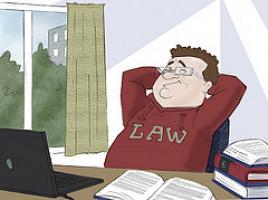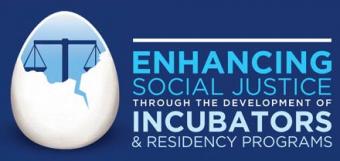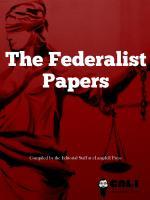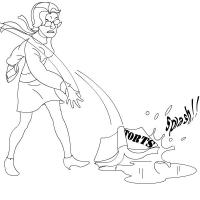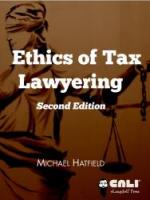I recently learned a new phrase “noisy learners”* to describe successful online learners. The same day, I noticed that the lettering for the “L” key on my laptop was wearing away. On the surface these appear to be unrelated events; yet I’d like to explore them both in this post, as there may be a tangential connection.
Get Aboard the Incubator Bandwagon!
I recently attended the ALI Incubator Conference. At least 30 schools are already running an incubator of some sort and another 50 seem to be launching something in the next 12-18 months. I won’t bury the lede – I liked EVERYTHING about how the incubator movement is shaping up in law schools. Here are my bullets…
Book of the Week: The Federalist Papers
The Federalist, commonly referred to as the Federalist Papers, is a series of 85 essays written by Alexander Hamilton, John Jay, and James Madison between October 1787 and May 1788. The essays were published anonymously, under the pen name "Publius," in various New York state newspapers of the time.
Author of the Week: Barbara Glesner Fines
Barbara Glesner Fines is the Ruby M. Hulen Professor of Law and Associate Dean for Faculty at the University of Missouri - Kansas City, where she has taught since 1986. Professor Glesner received her law degree from the University of Wisconsin at Madison and her masters of law degree from Yale Law School. She teaches Professional Responsibility, Family Violence, Divorce Process, and a Seminar in Ethical Issues in the Representation of Families and Children. Her recent publications include ETHICAL ISSUES IN FAMILY REPRESENTATION (Carolina Academic Press 2010); PROFESSIONAL RESPONSIBILITY: A COLLABORATIVE APPROACH (Context and Skills Series)(Carolina Academic Press 2012); Fifty Years of Family Law Practice - The Evolving Role of The Family Law Attorney, 24 J. AMER. ACAD. MATRIM. L. 601 (2011); Lessons Learned About Classroom Teaching from Authoring Computer-assisted Instruction Lessons, 38 WM. MITCHELL L. REV. 1094 (2012). Professor Glesner has held leadership positions in many organizations devoted to legal education, including the AALS Section on Teaching Methods (Chair 2012-13); the AALS section on Professional Responsibility (Secretary 2012-13); the Center for Computer Assisted Legal Instruction (Board of Directors, 1998‐2005; President 2002‐2005; Editorial Board 1998- current); and the Institute for Law School Teaching and Learning (Advisory Board 2003-date, Acting President 2006‐2008).
Lesson of the Week: Conversion
This lesson explores the cause of action of conversion as a means of compensation for intentional interferences with personal property. It will examine the several components of interest, invasion, conduct and remedy as the conceptual vehicles for study. Each section of the lesson will focus on one of these components, present the theory, and then give the student an opportunity to apply the theory or explore some of its ramifications. The lesson is designed to be comprehensive enough to be assigned without supporting textual assignment or classroom attention to the subject. Although the lesson is free-standing, students may find that completing the lesson on trespass to chattels before working on this lesson will produce more satisfactory results.
In its focus upon tort theory the lesson seeks to avoid immersion into the complexities of substantive property law and commercial law that are often litigated in conversion cases.
A separate lesson on Trespass to Chattels deals with the other cause of action that allows one to recover for harms to personal property.
Approximate Completion Time: 1.5 hours
Lesson Viewed
Contract Tutorials on Remedies - Expectation Measure
When the court awards money damages for breach of contract, it generally measures the damages by what is called the expectation measure or the expectancy. Referring to Hawkins v. McGee, this lesson explains how those damages are calculated. It presents basic measurement problems, rules and definitions, and then asks students questions based on hypothetical scenario designed to test their understanding of the concept in practice. Awarding a monetary compensation for pain and suffering is also discussed. The lesson concludes with a series of review questions.
Book of the Week: Ethics of Tax Lawyering
This chapter’s objective is to raise interesting tax ethics issues in practical contexts. There are 44 notes and questions to prompt and guide discussions, and primary source materials to inform the discussions (e.g., cases, IRC provisions, and Circular 230 excerpts).
Author of the Week: Brian Huddleston
Brian Huddleston has worked at the Loyola University New Orleans College of Law library since 1999 and is now the Senior Reference Librarian there. He is the author of five CALI lessons on legal research and served on the CALI Legal Research Community Authoring Project Advisory Panel for two years. Brian earned his undergraduate degree from Excelsior College while on active duty in the Marine Corps, then received his J.D. from the University of Alabama School of Law and his M.L.I.S. from the University of Washington Information School's Law Librarianship Program.
Lesson of the Week: Constitutional Aspects of Family Law
This lesson is an examination of the constitutional law aspects of Family Law. It builds upon lessons which provide a review of Constitutional Law in the Family Law context, but is much more detailed. It is intended as a supplement and review of constitutional doctrine as it occurs in specific Family Law areas such as marriage, divorce, parenting, procreation, sexuality, the rights of minors, and end-of life issues.
Approximate Completion Time: 60 - 90 minutes
#SuperCALIFlippalisticExperientiallyDistruptalicious
The theme for this year's conference is... #SuperCALIFlippalisticExperientiallyDistruptalicious
CALL FOR SPEAKERS
We are looking for law school faculty, librarians, and technologists with strong opinions, great ideas, interesting projects and useful advice to present at CALIcon. We deliberately ask for presentations at this seemingly late date in order to get the most cutting edge ideas and techniques for our attendees. So come share and be challenged. If you are willing and able to speak, your conference registration fee is just $95!
